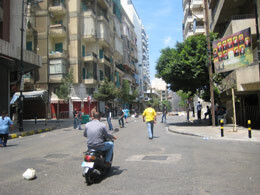Electronic Lebanon 11 May 2008

After most of the clashes came to an end, Beirut begins to recover. (Mona Alami)
Since the assassination of former prime minister Rafiq Hariri in 2005 — allegedly at the hands of the Syrians — and the subsequent resignation of Shia ministers from government, conflict between the opposition and majority factions has been brewing. The government is comprised of the Sunni Future Movement (headed by Saad Hariri, son of slain prime minister Hariri), the Druze Progressive Socialist Party (PSP), the Christian Lebanese Forces and the Kataeb party.
For the past three years, the Syrian and Iranian backed opposition has been battling the Western backed majority, originally over the internationalization of the tribunal for the prosecution of Hariri’s killers.
Since the end of the Lebanese civil war in 1990 and the signing of the Taef Accord by all participating parties — which called for the equal division of power among Muslims and Christians and the demilitarization of all militia groups — Hizballah, under the banner of resistance, has been the only party in Lebanon to keep its military arsenal. However, with the pullout of Israel from Lebanon in 2000 (with the exception of the Shebaa farms enclave, the rights to which remains the subject of much debate among Lebanon, Syria and Israel), the role of Hizballah and the legitimacy of its weapons was once again at the forefront of the political scene.
Tensions culminated in violence on Wednesday when protests called against difficult living conditions and high inflation turned into massive riots, with opposition Shia Hizballah and Amal forces fighting Sunni Future Movement members. The clashes were politically dovetailed on Thursday by a speech by Hizballah leader Hassan Nasrallah denouncing the removal of Brigadier Wafic Shoucair from his post as head of airport security, and the government’s investigation into Hizballah’s independent telecommunication network.
Hizballah’s leader ominously called the cabinet’s decisions a “declaration of war,” and the echoing gunfire in the capital’s mazy streets and posh neighborhoods seemed to confirm the announcement.
The Future Movement, clearly ill prepared and poorly trained for combat, retreated in the face of armed opposition factions that managed to take control of Beirut in less than 48 hours, and surround the residences of Saad Hariri, PSP Leader Walid Jumblat and the government building, which remain cordoned off by a protective buffer of Lebanese armed forces.
As the opposition forces advanced in Beirut, they systematically vandalized the property of majority figures and party members. Maya, a resident in the predominantly PSP area of Karakol Druze, witnessed the trashing of her parking lot by gunmen before the intervention of her neighbor, a Hizballah member, who also prevented the militia men from entering the building. “It was extremely frightening, they actually intended to storm the building,” said the mother of two toddlers.
Odette Alameh, who lives in the vicinity of Saad Hariri’s residence, said her building was targeted by gunmen posted on rooftops of a nearby construction. The Future TV news offices were burned down by the Syrian Socialist Nationalist Party (SSNP), who erected their flags on the blackened remains of the besieged building.
Ahmad, a resident of the mostly Sunni Ein Mreisseh area, said a neighboring building was stormed at 3:30am by militia men, allegedly leading to the removal of a Future Movement party member. IPS was unable, however, to confirm the information. Future Movement MP Ammar Houry’s apartment in the affluent Tallet Khayat area was ransacked by opposition gunmen, who according to neighbors, also searched the building for weapons.
Throughout the violent events of the past three days, the army’s approach has been one of positive neutrality in favor of the opposition. The Lebanese armed forces have refrained from declaring a state of emergency and refused to take part in the clashes, not leaving the government much margin for maneuvering.
“This is nothing short of a new phase in Lebanese politics,” said political scientist Amal Saad Ghorayeb, author of Hizballah: Politics and Religion. “The government’s decision [to remove airport security head Shoucair and denounce the party’s private communication network] was unprecedented, and de-legitimized the party’s right to resist. I do not see, however, the conflict prevailing for more than a few days,” she said. “I expect it to come to a quick resolve, due to the obvious disequilibrium in the balance of power.”
The political scientist stated that Hizballah’s proven military superiority will pressure the majority into a compromise. “It is inevitable — the government will have to resign,” she said. Saad Ghorayeb predicts that an interim consensus government will call for early parliamentary elections, a long-standing demand of the opposition.
As fighting subsides and the opposition asserts its control over the city’s western areas, the implications of the events unfolding in Beirut will certainly reach beyond the country’s boundaries and into the region’s far corners. “This will lead without a doubt to a drastic reconfiguration of the political order and might pave the way to a revision of the Taef accords, in order to correct the system’s imbalances,” said Saad Ghorayeb.
All rights reserved, IPS - Inter Press Service (2008). Total or partial publication, retransmission or sale forbidden.
Related Links





